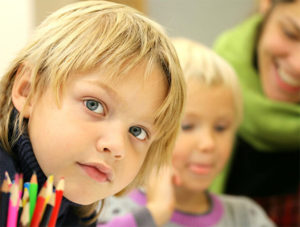We are enrolling! Join us in nurturing young minds, fostering creativity, and creating a brighter future. We're excited to introduce your child to a world of possibilities! Contact us today for details.

First of all, what is preschool readiness? Also known as kindergarten readiness, this is the child’s readiness to smoothly and successfully transition and integrate into the new environment of preschool, whether this may be for preschool or kindergarten. It is expected that the child would have the abilities in terms of physical, play, language, social, and self care. This would make it much easier not just on your child, but also on their teachers.
What Are Some of the Necessary Skills for Preschool Readiness?
Articulation. Clearly pronouncing individual sounds found in sentences and words.
Emotional Development or Regulation. Sensing emotion, incorporating emotion to moderate thought, understanding emotions, and regulating emotions; responding age appropriately to feeling frustrated (how a pre-k age child acts is different from how a kindergarten child acts), containing tantrums, and quickly recovering from being upset.
Executive Functioning. Higher level of thinking and reasoning, like figuring out how to make something, gathering the materials, and hurdling any challenges they encounter.
Planning. Doing a sequential task with multiple steps or an activity performance and being able to achieve the intended results.
Self-Regulation. Maintaining, obtaining, and altering behavior, emotion, activity, and attention, according to the situation or task.
Sensory Processing. Processing sensory stimulation accurately, including one’s own body.
Social Skills. Indulging in reciprocal interaction with others, whether in words or in action; compromising with others; recognizing and going with social norms.
Understanding. Comprehending the spoken language used in instructions, vocabulary, concepts, and instructions.
Use of Language. Creating sentences and using grammar and word order that are appropriate for their age, utilizing particular vocabulary, and being able to tell a simple story.
How Will I Know If My Child Has Difficulties When It Comes to Preschool Readiness?
Your child may have problems with preschool readiness if they:
- Become quickly frustrated when there are expectations set upon them.
- Are not interested in going through books and/or indulging in sit down pre-k activities.
- Have trouble following instructions for regular activities, including pre-k games.
- Are socially immature.
- Depend on their teachers or parents to do their self care tasks, such as hygiene, dressing, etc.
- Are not toilet trained during the day.
- Cannot understand simple questions.
- Are challenged by putting together sentences.
- Respond to questions with short sentences.
- Are difficult to understand.
- Do not interact easily or well with their peers.
- Are challenged in understanding the results of their actions.
- Have play skills that are limited.
- Are unwilling to do new activities and/or be guided to get new skills.
As A Parent, What Can I Do to Improve My Child’s Preschool Readiness Skills?
As you transition your child into the preschool environment, you increase the chances of your child being preschool ready by:
- Raising the expectations of your child when it comes to self-care tasks like eating, toileting, dressing, and getting ready to leave.
- Encouraging your child to develop relationships with both known and unfamiliar children of the same age.
- Exposing your child to books in order to prepare them for listening to and sitting down for stories.
- Starting to prepare your child by speaking about expectations during school, sit down activities, and appropriate behavior.
- Working with your child’s educators to find out any signs of slow development or deficit so those areas can be aimed for, prior to starting preschool.
- Increasing gradually your child’s exposure to other children through daycare, after school care, and pre-K or VPK programs.
- Using visuals like picture schedules to support your child in understanding their daily routine at home and at school.
- Developing fine motor skills.
Kids ‘R’ Kids Learning Academy of Valrico is A Good Place to Start
Kids ‘R’ Kids Learning Academy of Valrico in Florida guides and helps your child for preschool. Our home daycare in Valrico, FL, provides many special after school programs that would be of no cost to you. Get in touch with us now to start your intellectual, physical, and emotional learning, as they get ready for bigger school.